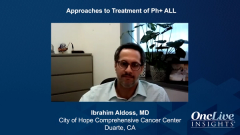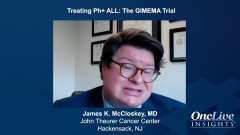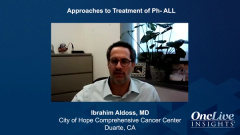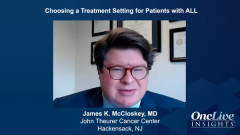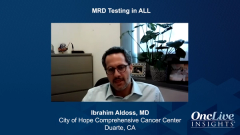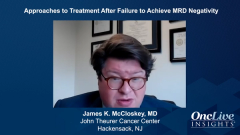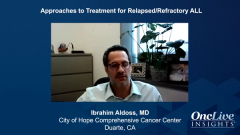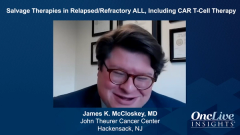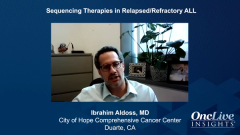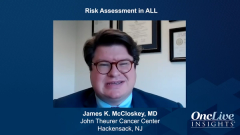
Salvage Therapies in R/R ALL, Including CAR T-Cell Therapy
Drs Aldoss and McKloskey describe treatments that can be used in the salvage setting of acute lymphocytic leukemia, including CAR T-cell therapy.
Episodes in this series

Ibrahim Aldoss, MD: Now, moving to more of the salvage therapy like CAR [chimeric antigen receptor] T-cell therapy, we can both share our experience. Considering both of us are oncologists in adult ALL [acute lymphocytic leukemia] and considering that CAR T is only approved in patients 25 years old and younger, but CAR T-cell therapy studies are available to many adults as well. I’m sure both of us have some experience with that. We can talk briefly about relapsed/refractory ALL, how these patients had poor outcomes before all these novel new salvage therapies. For the relapsed/refractory setting, with blinatumomab, inotuzumab, or CAR T-cell therapy, the responses are much higher than what we see with chemotherapy. Do you want to comment on the ELIANA study, James, briefly?
James K. McCloskey, MD: Everyone is familiar with this study now, looking at the use of Kymriah salvage therapy in patients under the age of 25 who’d failed 2 or more previous salvage regimens. It established Kymriah as standard of care in the pediatric patient population. When the data broke, we were all astonished by the incredible response rates and the durability of the responses, considering that these patients, even in the pediatric population, only survive typically around 6 months at that point. We saw very high response rates, 81% remission rates at 3 months, and depending on the data set, this was durable at 1 year in over half of patients. In the pediatric world, this was incredibly exciting, and I remember feeling like it was just around the corner for us as adult oncologists, right? We thought there were lots of exciting therapies there, and there are. And we will have a CAR T therapy approved in adult ALL soon, but it’s a different beast. These adverse effects and toxicities seen with CAR T are real, and hopefully newer products will become more tolerable. But in adults, particularly, we were hindered by toxicities and different disease biology, where the disease is not as responsive. CAR T in the pediatric population is different. Anecdotally, it’s sort of interesting because our pediatrics program here, from a clinical trial standpoint, hadn’t had as much involvement in CAR T, so we helped develop all their SOPs [standard operating procedures]. But I rarely see those patients because they’re typically followed by their pediatric oncologist, and even when they reach the age of 25, they may still be under their care. But we often help manage toxicities in all of them.
Ibrahim Aldoss, MD: We make our own CAR T cells here as well at City of Hope [Comprehensive Cancer Center], and we have significant experience, even as an adult oncologist here. We see these high responses in adults as well. Toxicity is always challenging, especially when we talk about older patients having severe CRS [cytokine release syndrome]. We see more neurotoxicity in older patients. But I would say it’s manageable. The problem with CAR T cells is it’s not immediately available like other therapies, and the issue with that is, we lose some patients from toxicity between the time we perform leukapheresis on the patient and they receive the CAR T cells. And, as you commented, there is an early adverse effect related to neurotoxicity. If you look at the ELIANA study, close to half of the patients end up being transferred to the ICU [intensive care unit] because of severe CRS. There’s significant risk of neurotoxicity as well. They are manageable, but also you can see a long-term complication of the CAR T cells, the B cells, they tend to have high risk of complication as well. One of the emerging questions is the role of the transplant after CAR T cells, and it’s a very debatable question. And we have seen the studies. It all depends on the construct of the CAR, the costimulatory [domain], the kind of patients you treat; would you transplant these patients or not? We still recommend a transplant for these patients because we see over half of them, they will relapse in the first year. And it depends, again, on the CAR T cells and the setting. If the patient already failed one transplant or a second transplant, is there a benefit to transplant this patient or not? It’s still an area of debate, but again, there are different factors, different from one patient to another, different from the CARs being used. What’s your approach, James? What are your thoughts on that?
James K. McCloskey, MD: Very similar. If we’re talking first relapse, or pretransplant in patients who’ve not yet had a transplant, or had a distance between their first transplant, we would typically transplant a patient a first time or even a second time if possible. We’re limited by data, particularly in these patients. To be fair, even in the ELIANA trial, it’s important to realize that the median age in that trial was around 12 or 13. That’s very different than a 21-, 22-, 25-year-old. We typically transplant them. There have been some series of patients and more data coming out, looking at sequential CAR T transplant. Just earlier this year, in the spring, there was a paper from [Nirali] Shaw, [MD,] I think, in JCO [Journal of Clinical Oncology] showing high response rate, long duration, and durability of response with this kind of sequential process. If we think about this in the relapsed/refractory setting, this might have different potential early in treatment. As opposed to blinatumomab or inotuzumab, there are distinct challenges that you’ve already mentioned, the toxicities, the logistics, and the cost, that make this not as appealing as a therapy to be moving early on. But that could change in the future as we develop other products with different tolerability profiles, and off-the-shelf kind of products might be more accessible.
Transcript Edited for Clarity


